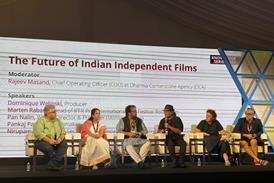When Greg Dyke was appointed chairman of the British Film Institute (BFI) earlier this year, he was asked why he wanted the job. Why would the former director-general of the BBC and one of the most powerful figures of the UK media industry want to throw in his lot with the BFI'
The BFI is celebrating its 75th anniversary this year, but there is considerable uncertainty about its future - its annual funding of $30m (£16m) of grant-in-aid, administered by the UK Film Council (UKFC), has been at a standstill for four years.
And by his own admission, Dyke is no movie buff. Ask him about recent films he has seen and he talks of family trips to Mamma Mia! The Movie and Sex And The City. However, many in the UK film industry hope Dyke is the figurehead the BFI needs. He may not know his Eisenstein or Kuleshov, but he will lend the BFI credibility as it strives to realise its long-standing dream of a National Film Centre. The hope is the Centre would house the BFI library and the BFI's special collection, which includes donations from David Puttnam, Joseph Losey, Derek Jarman, Michael Balcon and many others.
Dyke may also be able to help the London Film Festival, one of the BFI's flagship events, maintain its vision and independence. He quit the BBC in 2003 following criticism of the broadcaster by the Hutton Inquiry report into the reporting of a UK government dossier used to justify the Iraq War. This, and his many years in the cut-throat world of independent television, suggest Dyke is well used to working in high-pressure environments.
Dyke's agenda is clear. He is determined the BFI has a national reach, and talks of the danger of the BFI being too London-centred. He is also keen to ensure that, in the digital age, the BFI's riches - in particular its much-vaunted archive and library holdings - are as accessible as possible.
What was your perception of the BFI when you were growing up'
I used to go to a film club when I was at school and the BFI supplied films to it.
Did you perceive the BFI to be an elitist organisation'
I don't think so. It is an organisation for people who are interested in film. You could say it was elitist, but you wouldn't say that about (organisations for) fishing or flying or all sorts of other things.
Historically, (the BFI) has been for people who were, you could say, film buffs. The coming of the digital world allows you to expand that clientele.
I think there are many, many more people interested in film now. I am 61, I've got kids in their 20s and early 30s. They know about film in a way we never did. They know how to produce it, how to make it and who was in it. When people talk about the moving image being the educational and communication tool of the 21st century, I think they're right.
How much time do you spend on BFI business and what have been your initial impressions of the organisation'
I spend on average one day a week, maybe a bit less. It's an interesting period. The opportunities available for an organisation like the BFI are phenomenal, which is why I was interested in doing the job in the first place. The opportunities of the digital world mean there is this incredible collection of film you can now make available. That's the challenge of the next decade. I'm in favour of rolling out 'mediatheques' (in which the public can access the BFI's digital film archives) across the country.
One of the great dangers of all British institutions is that they become London institutions. It's vital we're a British institution.
How can that be achieved in practice' Could the National Film Centre the BFI has long been planning be situated outside London'
No, I think if you're going to have a Film Centre, you are going to put it in London. But it's also a digital centre. Whereas historically you needed to travel - to come to the library for example, you had to come to London - you won't have to do that in future. In the educational world, the study of film and television has exploded. The BFI could supply a phenomenal amount of material for that. At the BBC, I was interested in how you made the archive available. But there is, of course, a rights issue in all this stuff.
One of the BFI's key interests is the London Film Festival. Some people advocate a festival with more glamour and red-carpet events, while others see it as a cinephiles' event. How do you see it evolving'
I don't have a problem with glitzing it up a bit as long as you don't undermine the integrity. Film festivals work because somebody has a vision. When you hand the vision over to the committee, you're dead. If you look at television, one of the reasons ITV has such problems is that it handed creativity over to the committee. Suddenly, the sales people were allowed to make decisions. Sales people have never made a creative decision in their lives. It happens in magazines, it happens in newspapers. If you have the sales people running things, you're in real trouble.
There is no problem about making the LFF bigger, a bit glitzier and with a few more red carpets. That's not the issue - the integrity of the festival is.
Do you and Stewart Till, chairman of the Ukfc, have a shared vision of how the festival might evolve'
That is the discussion that is going on. I understand the vision Stewart has.
Do you endorse that vision'
We (at the BFI) will say this is how the film festival can change to - we hope - meet your vision without undermining the vision of the people who run it and the integrity of the festival. It's a delicate negotiation.
What do you think of the programming'
(This year's opening film) Frost/Nixon is a good example of the sort of film that should be at the LFF. I haven't seen it, but I know the play. I know Frostie (Sir David Frost) pretty well and I know his version of it. He's going to come to events during the festival and I'm going to ask him about it. I know the history and so I'm going to try to see how much of the history is real in the film. We go back a long way.
How would you characterise the relationship between the BFI, which is celebrating its 75th anniversary, and the Ukfc, which was set up in 2000'
'Interesting' is how I would characterise it. The government gives the money to the Ukfc and the Ukfc gives it to the BFI. Inevitably, at times, you will have a difficult relationship - as you would between any funding body and those it funds. Anybody I know in the public sector always thinks they should get more.
The UKFC has a range of things to do with its money and the BFI is the single biggest grant. The belief there is going to be loads of public money around - forget it! We all know what the economic situation is.
Do you believe it is necessary for the relationship between UKFC and the BFI to continue' Would it be better if the BFI was autonomous'
That's the way it is. Whether it is necessary or not is almost irrelevant. I can't see it changing in the near future.
Given that this is a difficult time economically, how easy will it be to realise the dream of the National Film Centre'
We're looking at the centre in terms of scale for that very reason. We know what the government has said is available from them. We know we can sell buildings. We know we've got to raise money either from sponsorship or philanthropic giving. Do people give less in hard times' Yes, I expect so. It will be tough but not impossible.
What would be a ballpark figure for the cost of the National Film Centre'
We are doing that work now. We are looking to see if we can build it for less. The government has said that as long as we can satisfy a range of criteria for them, there is close on $91m (£50m) (of public funding) available. What we're talking about is, does the Film Centre cost $365m (£200m) or $275m (£150m)'
Can you do what needs to be done for a lesser figure'
(Sir John Paul) Getty was a big benefactor in the past, but there aren't many people like that around now. You only need one. You've got to find them! But we're not at that stage yet. I don't think there is any point in going out to philanthropic giving or to sponsorship until we've tied up the government's sum.
How have you found morale among the people who work at the BFI'
I've found morale pretty good but I would, wouldn't I' If you're the chairman walking around, most of the time people don't come up and whinge to you. But I've found morale pretty good. The new BFI Southbank has been a big success. It is certainly full of life whenever I go in there, buzzy and interesting - quite a sexy place to be. I sometimes feel I'm a bit older than everybody else, but that happens to the best of us. I think the money the government has given to preserve the archive has demonstrated to a lot of people that the government does care. Talking to the Conservative party, I think they care about the same thing as well. What you can do with the archive is irrelevant if you cannot preserve it. I think this government has understood this and the (Parliamentary) Opposition understands it too.
You were in the eye of the storm at the BBC at the time of the Hutton Report into the BBC's reporting of the Iraq War. There is obviously a lot of debate, controversy and conspiring that goes on around the BFI - how does it compare to what you have experienced before'
I've never been good at recognising that stuff, which has always been a massive advantage. I didn't understand the politics of the BBC, which was great because it meant I didn't get dragged down (by it). I just got on with doing things. My view is: 'What are the things we want to do' Okay, let's do them.'
It's the same with the BFI. What do we want to do' I said to (BFI director) Amanda (Nevill), tell me what you want to do. Let's work out if the board agrees. If that is the case, how do we do it' You don't have to live in the minutiae of organisations. The role of the board is to ask: 'What are we trying to achieve here''
It's no secret the BFI has not effectively had an increase in its grant-in-aid to keep pace with inflation in several years. You have to say: 'Okay, what do we do' What matters most' What might we not do'' That's public sector for you. It is great at starting things, but not very good at ending things. Sometimes, you have to end things.
Is there a prospect of an increase in the BFI's public funding in the near future'
I hope so. I hope we can get, at the least, a cost-of-living increase. One of the disadvantages of being 75 years old is that you've got a lot of people on pensions. You've got to fund the pensions. One thing we all know is that the actuaries who are the most conservative profession in the world weren't conservative enough. They got it wrong for many years. Therefore, the funding of the pension scheme goes up here every year.
But I don't want to whinge about money. My view is that when public organisations just whinge about money and think money should grow on trees, they should forget about it. I was lucky in my time at the BBC. We got a decent licence fee increase. If we hadn't, we would have adapted and done other things.
The BFI's now-defunct production arm supported UK film-makers such as Peter Greenaway, Ridley Scott and Terence Davies early in their careers. Would you like to see the BFI back making things or has that moment now passed'
I think it's gone. Whether it was right that it has gone, I don't know. There is no point in speculating about things that aren't going to happen.
Have you set yourself goals' What would constitute success for you as chairman'
There's no point in the board having a vision that the management hasn't got. In that case, you won't be there very long. The thing about public-sector organisations is that in the end, everybody can always see you out. For me, there were two things when I took the job. One was that the BFI is the British Film Institute, not the London Film Institute.
Two, how, then, do we make what we've got as accessible to as wide a group who wants to access it as possible' It could be at times that you offend the buffs. That's life. In all organisations like this, there are people who think making what you've got as accessible to as many people as possible is not what you want to do. When I was a trustee of the Science Museum, there was always this debate over whether you are part of the entertainment industry or part of academia. Of course, what you are trying to be is both - to be intelligent and accessible.
Is the BFI succeeding in being both intelligent and accessible'
The BFI has to some extent reinvented itself in recent years. I don't think this is actually in the public mind yet. People still think sometimes it's a stuffy organisation. Go to the South Bank and you won't think it's a stuffy organisation.
How have the press reacted to you becoming chairman of BFI' Many profiles of you, despite all you've done in your career, still mention your part in creating a puppet rodent on breakfast television in the early 1980s.
Oh, Roland Rat! I loved doing breakfast TV. It was a long time ago. These things stick with you; it's too good a headline. I remember getting the job to run London Weekend Television and The Sun wrote 'Roland Rat's Dad Gets Top TV Job'. I go across the spectrum. I've always liked popular television just as I like intellectual television. I get a bit annoyed by people getting sniffy about 'popular', as if somehow being popular means it doesn't have any value. I don't believe that. There's crap in both the popular and the esoteric.






















No comments yet